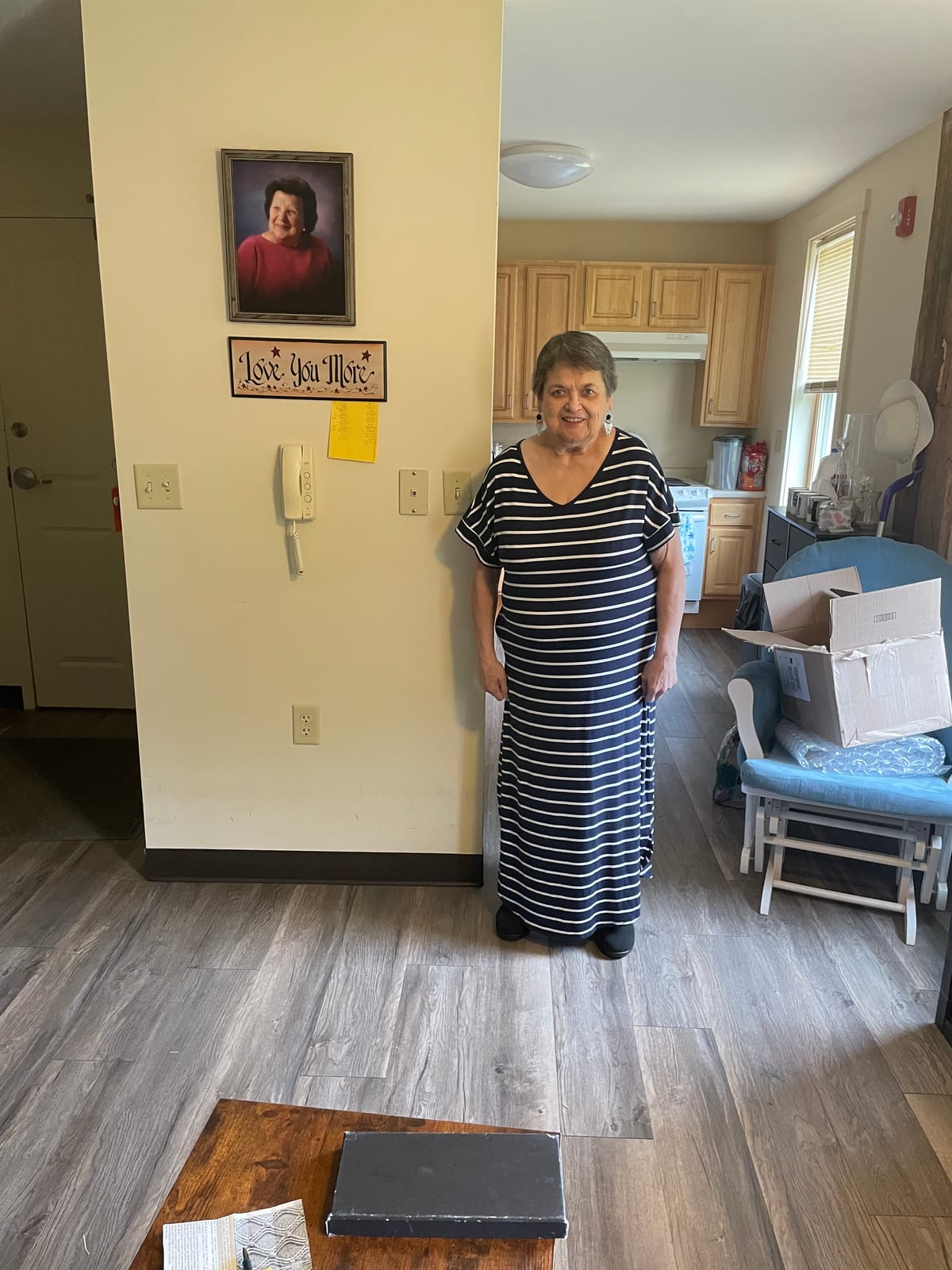Dear reader, this healing story is so special to me for so many reasons. I hope it gives you goosebumps, too, and inspires you to become the kind of doctor and healer the world needs. The story you're about to read represents the way that I think primary care and healing should be: accessible and affordable to regular people in small towns, with the power to change lives through consistent contact, and the stacking of incremental changes that lead to radically improved health outcomes. That's the power of a healing relationship.
Just a few short years ago, Debbie was wheelchair-bound, dependent upon oxygen, and literally trapped in her body, confined to her living room. As you'll hear from her, she knew she would die like this if she didn't get help. Her story is powerful because it combines the best of many worlds: the tools we have in Western medicine to help folks change their relationship with food, and the tools Debbie has developed along the way to take care of herself. This self-healing is a huge part of her story, and one she is quite outspoken about (and rightfully so - her progress is hers to own).
Debbie would love to speak to others who are in the throes of addiction to processed food. She wants others to know that they can be free, and feel proud of, and in love with, their own bodies (even if that feels impossible right now). You can reach her by email at reggiew1918@yahoo.com.
If you'd like to learn more about Dr. Malik's incredible practice, click here. To learn more about the beautiful world of direct primary care and the freedom, autonomy, and rich reciprocal relationships and flourishing it enables for patients and physicians alike, check out my website page for an intro and resources.
A note from Olivia:
When I met Debbie for the first time, I was rotating with Dr. Malik at Blue Spruce Health, a direct primary care practice in the Northeast Kingdom of Vermont. Newport, VT is a working-class, mostly Medicare/Medicaid community in the mountains nearly in Canada (Quebec is so close that Border Patrol monitor the neighborhood of my friend Steve, who I stayed with for my second rotation).
When Debbie arrived to the clinic, Dr. Malik's incredible nurse Chelsea came to the door of our room and exclaimed: "Debbie's here! She walked in!" I wasn't sure what was astonishing about this until I heard her story. Let's rewind to the beginning: Debbie first came to see Dr. Malik in July 2022 at the behest of her home health aides. These aides came to her home daily to bathe her with sponges, refill her cooler with ice by her chair in the living room, and ensure she had access to water. Debbie was existing solely in her living room and only left the house to attend doctor's appointments, which she reports she went to religiously, several times a month. [Dear reader, I find this to be a horrible irony - this sick human being saw physicians endlessly, who failed to help her improve her health in any way - until she saw a direct primary care family doctor. This is representative not of those physicians' failings, but of the brokenness of our sick care system and its focus on easy, controllable interventions like pills and surgeries, and the way it disincentivizes identifying the root causes of disease - which lie in the ways that our patients are living and interacting in their worlds.]
It is important to recognize that Debbie's health and healing were made possible by intricately weaving in things that were meaningful and important to her. Telling patients what to do is unhelpful; connecting small, achievable goals that shift unhealthy habits so that patients can live the way they want to is the key. Debbie wanted to live her life fully, unconstrained by her excess weight, or her oxygen. She identified the desire to be able to play with her grandchildren - and play with her grandchildren, she did, last summer. I wish you could have seen the joy in her smile when she told me the story of calling her grandson and telling him that next time she came to visit, she wouldn't be in a wheelchair, or with tubes attached. Her grandson was so confused. He'd never known another version of his grandmother. But he saw that new Debbie just a few months later, and got to play with his grandmother.
I know her story is already impacting lives far and beyond her family members,. I am infinitely grateful to Debbie for sharing her story with me and being willing to be on this blog, for, dear reader, this is what healing means to me: saving a life in time for a life to be lived. This means intervening decades before the devastating stroke or heart attack. It means helping patients develop simple, inexpensive, accessible behaviors to change daily habits and patterns that support metabolic, emotional, and spiritual wellness. Because, to quote Casey Means, MD: disease isn't an accident. It's a culmination of our daily decisions.
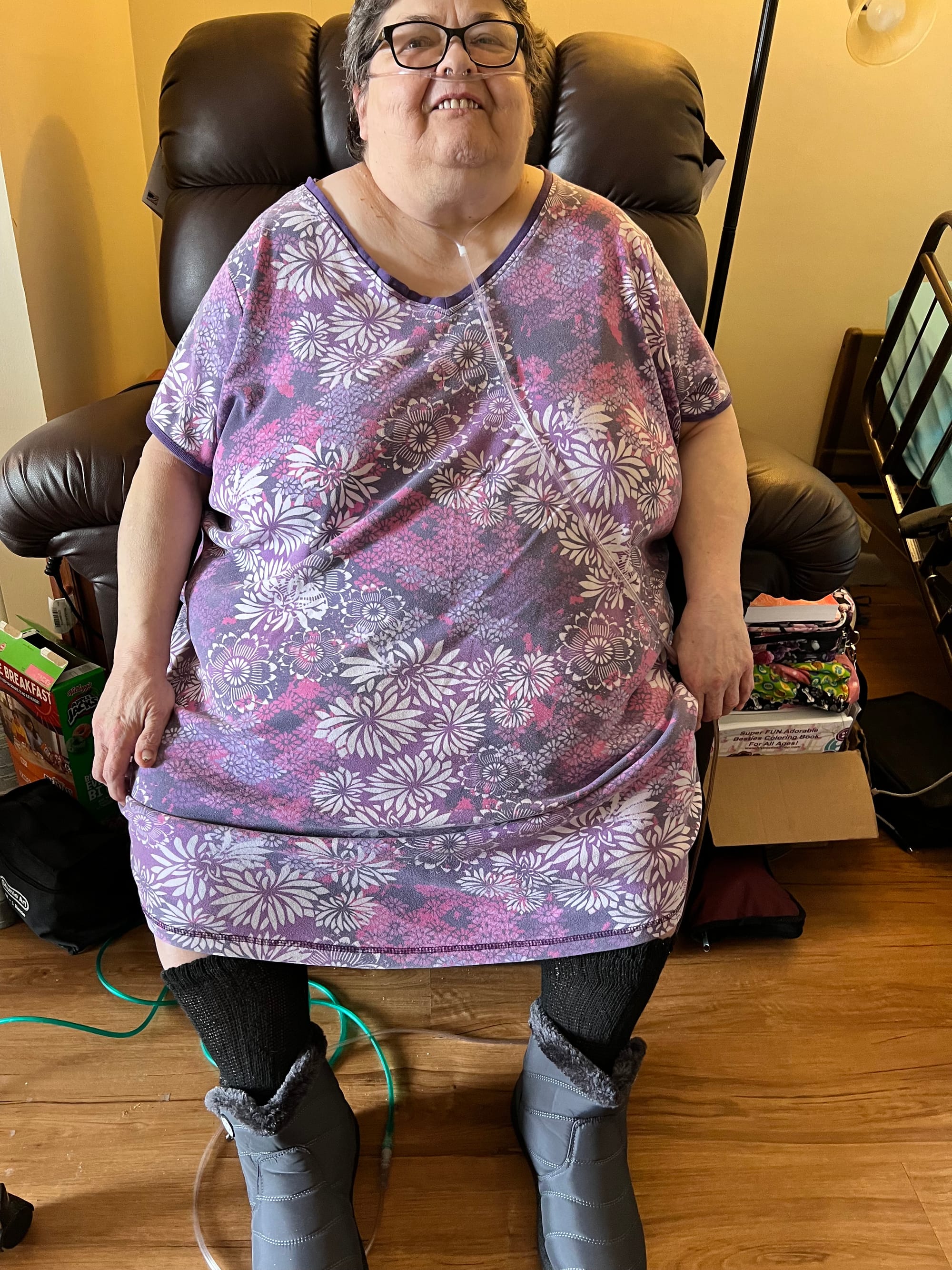
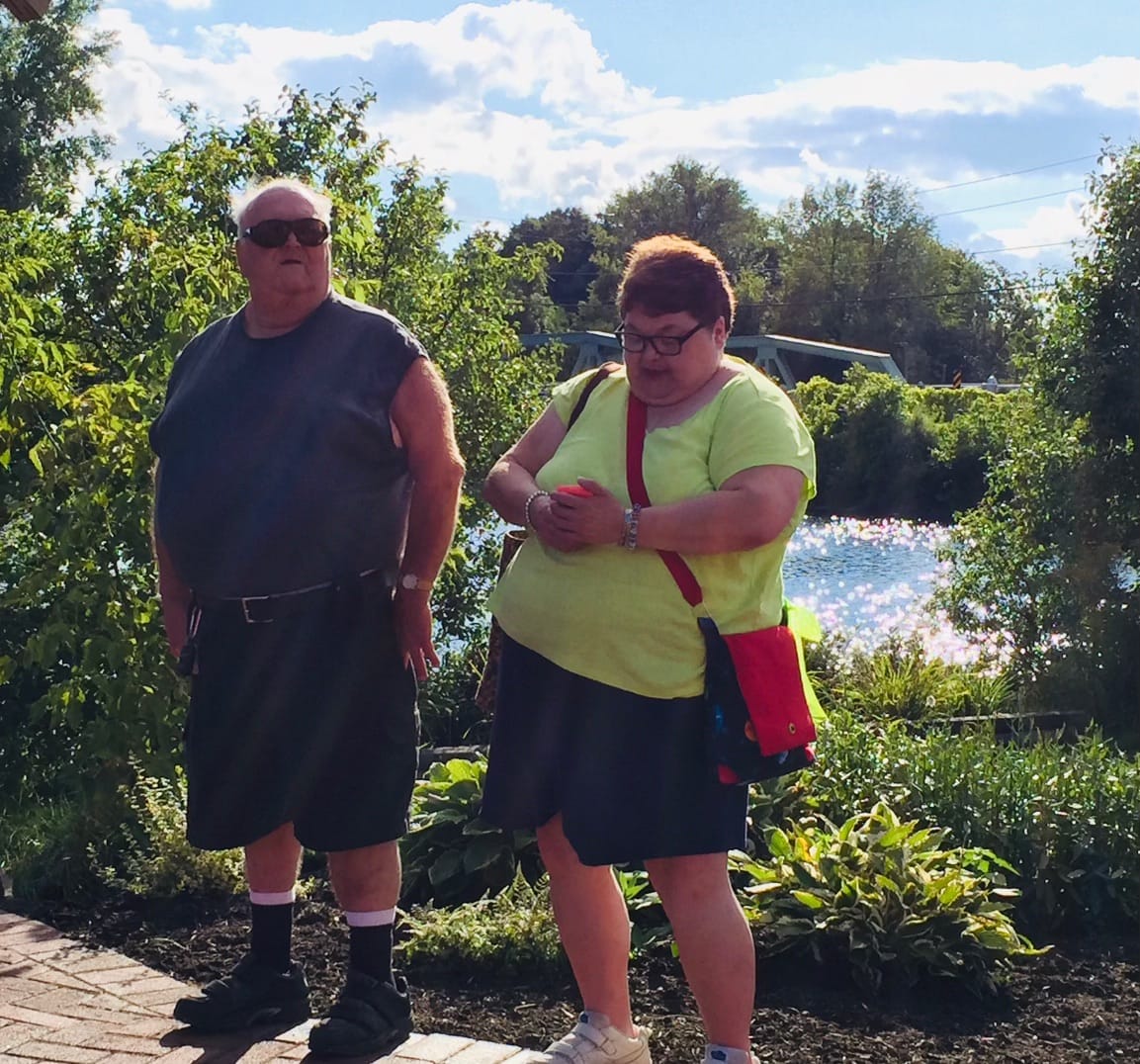
Debbie, before
What was your life like before you met Dr. Malik, and began your journey of healing?
Debbie: "Before 2022, I was going to the doctors, trying to get help. I had both my knees done previously, and I broke one of them again, and I couldn’t have it operated on because of my weight. When they did my knees the first time, they had to stop surgery because my oxygen levels went too low. Then they didn’t want to operate again. And they told me I couldn’t lose weight.
I was stuck in my living room for six months. I was lonely. I didn’t cry, I just grinned and bore it. But I had very little company. If the girls hadn’t come in to help me, I wouldn’t have seen anyone for days. I don’t know how come I didn’t just go crazy. I’d put my dishes in a filing cabinet, and had my coffee pot and toaster right on top of the cabinet. I made my lunch and supper on that every day. I had a cooler with some ice in it that the girls would switch out. I couldn’t go shopping. I hadn’t been to a grocery store for three years until I started getting better.
I used to take insulin twice a day. I was a diabetic. Now I don’t use any insulin.
The only time I left the house was to go to the doctor. I had no life. I couldn’t take it anymore. I realized if I didn’t do anything, I was going to fizzle away and die.
The girls who came would care for me. They'd wash me too. I had ulcers on my legs, in between my leg and my belly, and my skin would be raw sometimes from the heat. I ended up in the hospital because the skin between my belly and leg was so raw that I couldn’t walk. I couldn’t even walk to the bathroom because of the pain. Finally after 3 days of suffering, I put myself in the hospital. The doctors and nurses couldn’t believe that I had waited so long - I ended up staying there for a full week. I waited so long to go there because I was so used to the pain - I just assumed it would be like that for the rest of my life.
How and why did you start seeing Dr. Malik?
Debbie: That girl who came to my house and took care of me said “You’ve got to go see Dr. Malik.”
When I first went to go see him, he said “What can I do for you?” I told him "I want this weight off and I want to stop oxygen. They tell me I can’t get better but I know that’s not true, I don’t believe it." Dr. Malik agreed with me. But he told me: "If you’re not going to work it, then don’t come see me. I won’t waste time on somebody who doesn’t want to help themselves."
But I was ready. I started losing weight, and then we just continued the process. I can be a little stubborn, so sometimes he would sternly tell me to listen again. After fifty pounds, I got rid of the oxygen. I just kept going. When I was down enough, I had my surgeries: my belly first at Dartmouth in July 2023 to remove the 22 pounds of loose skin that made up my pannus. They put eighty staples in me after that surgery. Then I had my knee done in Burlington at UVM.
Even though seeing him is $105 a month, it’s unlimited. I can call and text him any time of day.
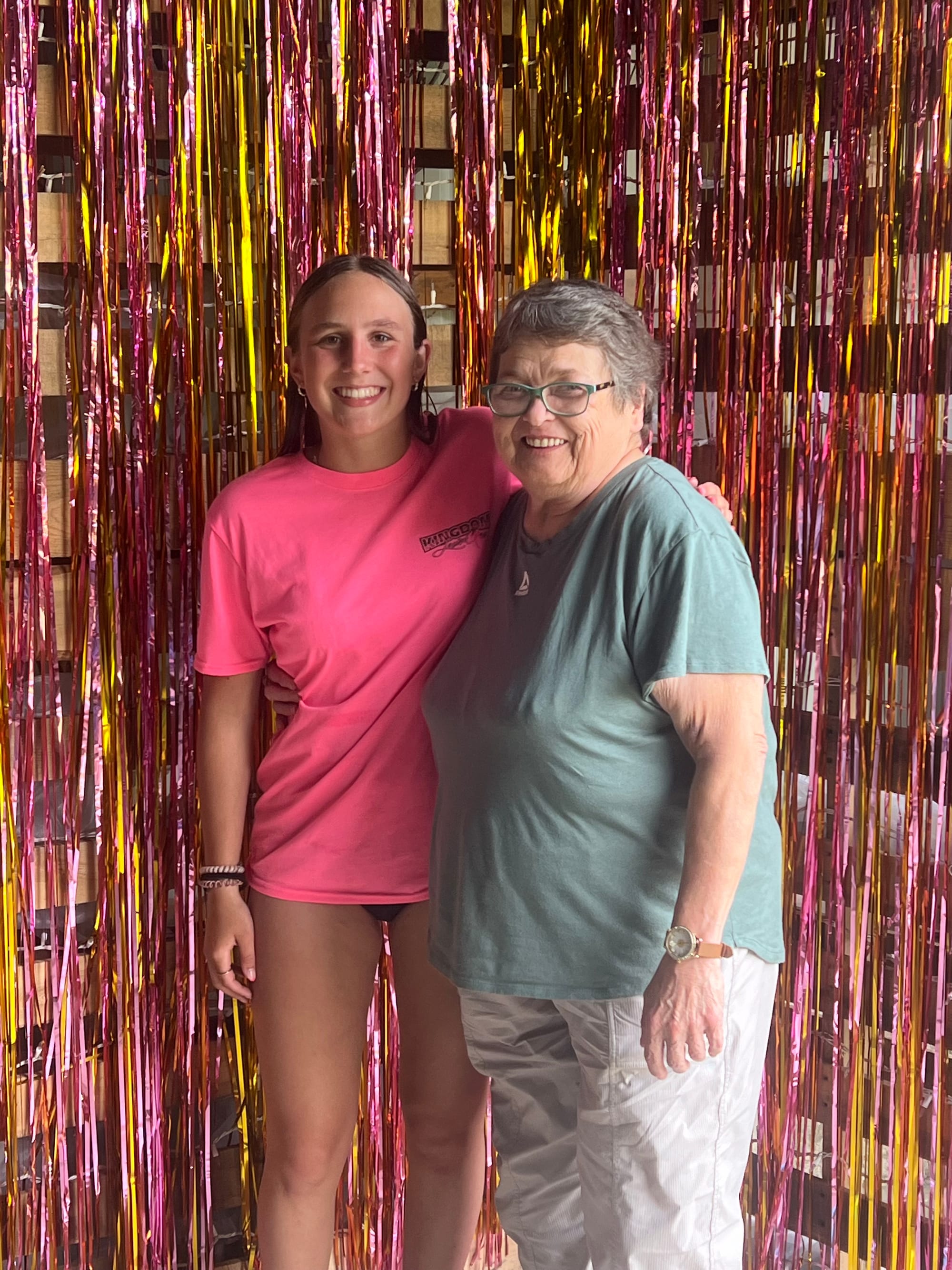

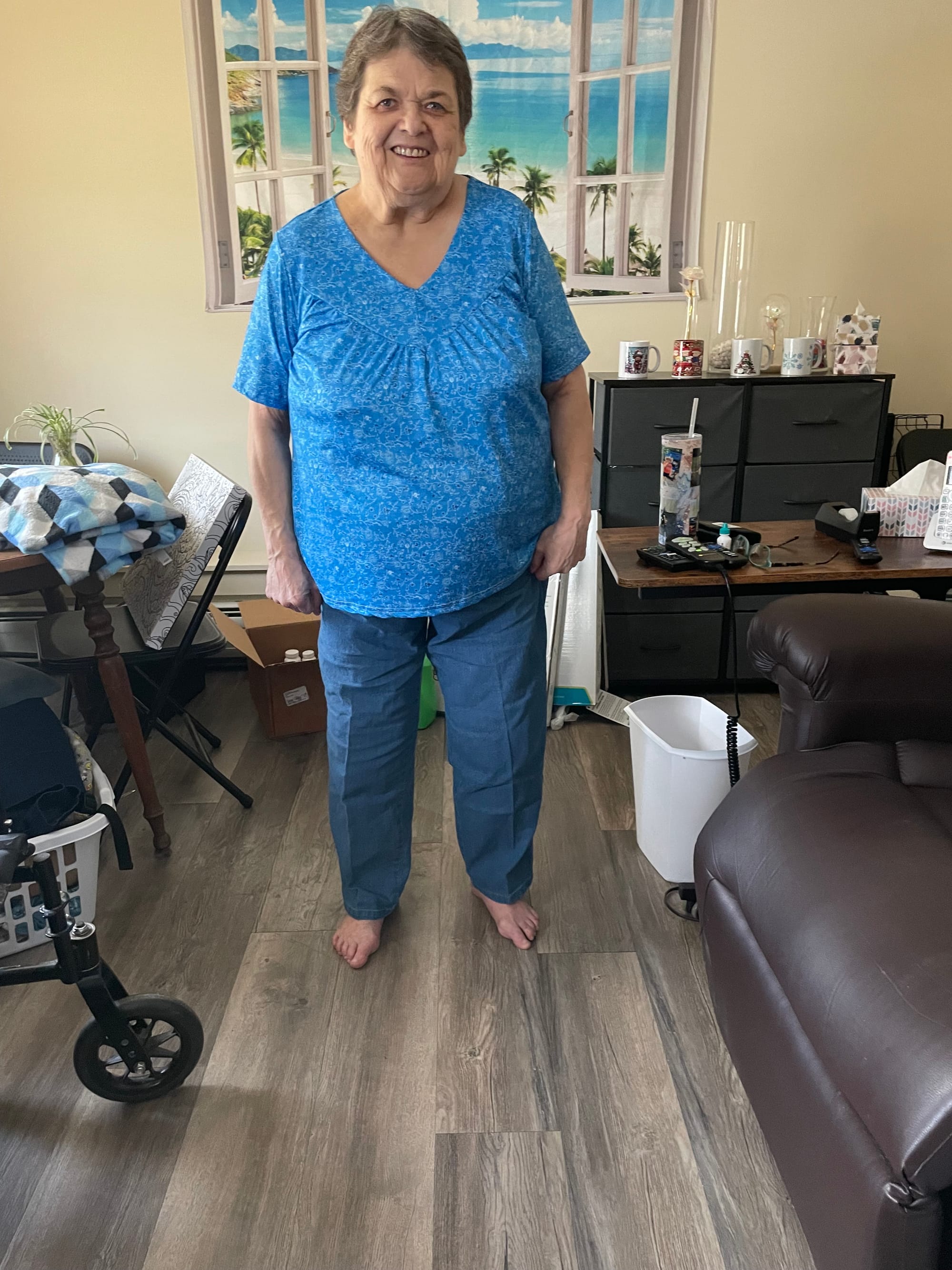
Debbie, now. Walking, off oxygen, able to live and thrive.
Debbie, how much weight have you lost? What is your life like now?
Debbie: So far I've lost 180 pounds. I just went to a graduation party, and the people there hadn’t seen me in years. They were stunned.
Now, when I go see Dr. Malik, he is so proud. Every time I see him I tell him thanks so much for helping me. And he tells me I did it, but he really did it too.
Looking back, I feel like a new person. Doing what I did brought the real Debbie out - before, when I was sick, the real Debbie was getting lost. It’s like a whole new world now. I feel like I’ve died and reborn again. It’s a great feeling.
I'm not totally better, because my equilibrium is a little messed up because of all the weight loss and my surgeries. But I can walk and get around on my own. I still have back aches and pain, but I don’t like taking much pain medicine or the really rugged stuff. I grin and bear it unless it gets really, really bad. I do have spinal stenosis. I tried some medicines, but they don’t really work. I want to get my back fixed next so I can walk around more and really enjoy movement.
How did you lose the weight?
Debbie: I take Ozempic, but sometimes I forget it - for two weeks or longer! Some people say that ozempic is what did it - but I get so angry when they say that. It helps curb at night when you’d normally snack, but it’s not a miracle drug. People think it is. Losing the weight was a lot of hard work. People think it was easy street for me, and it wasn’t.
What the ozempic really helped with is not eating compulsively. It helped me stopped eating when I was bored or needed something to do. Now I knit or do something else instead. The ozempic took away the need for instant gratification. Now I eat when I’m hungry and I know it’s ok to skip meals if I’m not hungry. The doctors always told me I can’t miss meals because I’m diabetic, but now I know it’s ok to not eat if I’m not hungry.
Before, I was one of the worst junk food junkies you’d ever meet. I was into candy, chips, desserts in general. I could eat a whole huge Whoopie pie in one sitting. The desserts had taken over my body - the chocolate, the candy. I didn’t have any control over it. It was too far gone. I got to the point where I’d buy confectioner’s sugar to make frosting, and I would eat it straight.
I did the work to change that. For example, a few days ago, I was at Mobil station getting gas getting coffee, and I was looking at all their homemade goodies. But I don’t crave it anymore. I have a little bit, once in a while, just to tell my body that it’s not starving for whatever it wants I guess.
Now, I don’t eat much - even though it wasn’t how much I ate for me, it was what I ate. If I eat just regular food, I don’t eat much.
What is the biggest problem in medicine today, from your perspective?
Debbie: The doctors have too many patients each day. They try to get as many as they can so they can get paid really good, or so they can only work three or four days a week. At Dartmouth for my belly surgery, they weren’t kind to me. Their compassion is all gone. It’s all about money now.
For example, One doctor I went to see came in the waiting room and said to me, didn’t even say hi or how are you or anything, he just said “Don’t you think you should lose some weight?”
When my back is better, or maybe sooner, I am going to make damn sure I go back and see a doctor I used to see. He told me I was too far gone, that I couldn’t get better, that I couldn't lose the weight. And he was wrong.
Debbie, what are you going to do now with your magnificent story and journey?
I want to help other people do what I did. I tell Dr. Malik I will go talk to the other patients. I will go to their houses. I want them to feel the way that I do - I put on my bathing suit and I am so proud. I’d like to be an advocate. People don’t think they can do it - I didn’t think I could either. But I did, and now I want to help others.
